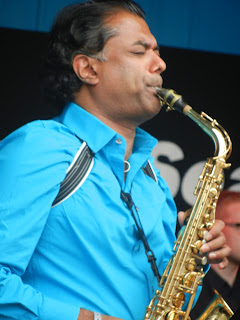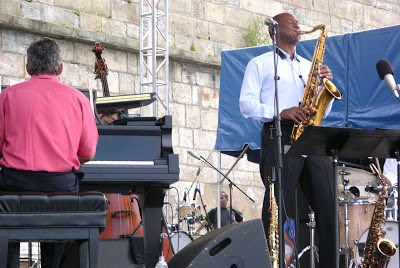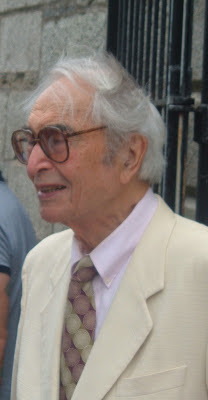A ton of fine music came out in 2012, like most years, making these year-end lists very difficult. A lot we don’t get to hear. So that limits some. For example, I’ve not yet heard the 2012 disks of Jack DeJohnette, Christian Scott or John McLaughlin and the Fourth Dimension. Having seen each of them live in 2012, it’s easy to know their disks must be superb. Their concerts were fabulous. Also, Top 10? Not happening. It’s a smattering. I did whittle some worthy recordings away. And separated out a Vocalist section. Let’s get to it.
No particular order:
Jazz Soul Seven, “Impressions of Curtis Mayfield“ (BFM Jazz). thought this might be over-funked, formulaic jazz before I slapped it in the machine. Wrong from the get go. It grooves like hell, but it swings too. All the players are outstanding, creative and improvisational, without too much “look at me.” Terri Lynne Carrington’s grooves are sweet, but by no means simple. And Wallace Roney and Erie Watts blare their horns with jazz pride. Phil Upchurch is tasty as hell, as is Russ Ferrante on piano. Let’s not forget the ever-hip music of Mayfield, a master in his field.
[Wallace Roney at the North Sea Jazz Festival, 2912. © R.J. DeLuke]
John Daversa, “Artful Joy” (BFM Jazz). Daversa has a real knack for writing, arranging and getting a band to play their asses off. Easier said than done. His tunes are a marvel of modern hip, slightly genre-bending, and just plain exuberant. He travels a lot of musical ground without losing interest. And the playing is hot shit. (see previous blog).
Marshall Gilkes, “Sound Stories” (Alternate Side Records). Another album where the leader shines with the pen, as well as his instrument, trombone. Gilkes is a monster on the ‘bone and is matched on the front line by Donny McCaslin, who’s a bitch on this record. The rhythm section makes each twist and turn easily. Great melodies too. The many compositional colors here really shed the light on Gilkes as a cat who is a superlative musician. This is hot shit.
[Marshall Gilkes at the Newport Jazz festival, 2012. © R.J. DeLuke]
Branford Marsalis, “Four MFs Playin’ Tunes” (Marsalis Music). Band that’s been cookin’ for a long time. Different textures, different feels. All directed through Marsalis’ vision and his powerful horn. Calderazzo remains one of the unsung excellent pianists. The record can groove you and scorch you. It‘s soft side is delectable.
Jonathan Blake, “The Eleventh Hour” (Sunnyside Records). A great debut by this young drummer who enlightens the music of many a hot bands on the scene today. For his first album, he brings in strong players like Ben Street on bass and pianists Robert Glasper and Kevin Hays. Saxes are Jaleel Shaw and Mark Turner. But they are there to serve Blake’s vision, which is sharp. Real engaging stuff, driven by outstanding drum work, of course.
Adam Cruz, “Milestone” (Sunnyside). Another debut from a drummer, this disk shows the veteran Cruz holding court to carry out his own compositions. The music is outstanding start to end, carried out by BYC cats that Cruz has played with and known for a while--Chris Potter, Steve Cardenas, Ed Simon, Steve Wilson, Ben Street and Miguel Zenon. They’re all on their game, and Cruz propels them with his intricate percussive statements. Cruz should get more opportunities to be a front man, as this disk shows.
Luis Perdomo , “Universal Mind” (RKM Music). Perdomo is a monstrous pianist and this trio date is remarkable. It was also the fruition of his dream to one day play with Jack DeJohnette, who is killin’ throughout the recording. As is Perdomo. The music is written by Perdomo to allow the group to take off, without worrying too much about arrangements, and they do. Exceptional.
[Luis Perdomo at Freihofer's Saratoga Jazz Festival, 2010. © R.J. DeLuke]
David Gilmore, “Numerology; Live at the Jazz Standard” (Evolutionary Music). This music kicks ass. The music is enthralling, exotic, played by a group of real heavyweights who bring Gillmore’s amazing music to brilliant life. Everyone is in top form (Christian McBride, Miguel Zenon, Tain Watts, Mino Cinelu among them) Claudia Acuna adds occasional ethereal vocals. Luis Perdomo (see above) is absolutely fiendish on the piano. Gilmore’s guitar, surprisingly, doesn’t really take center stage but wails with delight. It’s a group effort, but Gilmore’s the cat behind it all.
Michael Pedicin, “Live @ The Loft” (Jazz Hutt) Granted I fell in love with his ballads album last year, which caused my ears to turn toward this disk. But it holds up just as fine. Pedicin comes through the tradition of the greats, Dexter, Sonny, et. al, with a beautiful warm tone and great creativity. This time a it’s a live disk with a varied program and his band is up to the task. Pedicin is a joy.
Ehud Asherie, with Harry Allen, Upper West Side (Posi-Tone). This is all about Harry Allen. His sumptuous sound, way with classic melodies, his harmonic interweaving, his creativity. Warmth. Like Pedicin, a joy as he strolls thru great songs.
[Harry Allen, Newport Jazz Festival, 2010. © R.J. DeLuke]
Philip Dizack, “End of an Era” (Truth Revolution Records) Great craftsmanship in the writing of the mostly original compositions, augmented beautifully by string sections. Some of the fine New York cats add a lot, including Kendrick Scott’s drums, Aaron Parks piano. Dizack’s trumpet dances delightfully throughout.
Duduka Da Fonseca, “Samba Jazz - Jazz Samba” (Anzic). This band plays this kind of music so beautifully. Pianist Helio Alves and Da Fonseca are long time colleagues and it shows. Anat Cohen, always wonderful, digs into the material with fire. Strong from start to end. Great spirit.
Andrea Brachfeld, “Lady of the Island” (Zoho). This woman can bop and groove and plays the hell out of the various flutes. Great tone and harmonic-melodic sensibilities. She’s less percussive than some flautists, which probably makes her a more complete, natural player. Bill O’Connell on piano is outstanding and there are guest spots by Wallace Roney and Wycliffe Gordon. Mostly cover material. There’s a beautiful Latin feel to Herbie’s “Eye of the Hurricane.” She also tackles Freddie Hubbard and Duke.
Brubeck Brothers, “Lifetimes” (Blue Forest Records). Maybe the best recording of this outstanding, longstanding, and somehow underrated band. It jumped on my list when I first heard it in June. Crisply executed by four superior musicians. It’s a record with a definite nod to Dave. It might be held in a different light now, due to the recent passing of the icon, but it stands as a great testament. The tunes associated with the Great Father Who Made Them All have really outstanding arrangements and bring a bright new slant to the material. There is other material there too, equally strong. The playing is excellent. (By the by, Dave heard it all and loved what the cats did with his stuff).
[Brubeck Brothers, Freihofer's Saratoga Jazz Festival, 2008. © R.J. DeLuke]
Erena Terakubo with Legends, “New York Attitude” (King Records) It’s the American debit of a young Japanese alto saxophonist who plays with flare, technique and feeling. When it swings, it’s like mad, and in between it’s first-rate stuff. It definitely helps that Kenny Barron and Ron Carter play their asses off in the band. But it’s a real fine album, and Terakubo is very strong, whether fast or slow. She holds court admirably. There’s sure to more from her.
Riccardo Fassi, “Sitting in a Song” (Alice Recordings) A varied collection of compositions by pianist Fassi with first-rate New York cats; trumpeter Alex Sipiagin, sax men Gary Smulyan and Dave Binney, drummer Antonio Sanchez, bassist Essiet Essiet and trombonist Andy Hunter. Glides along terrifically, fast or slow. Solos are hot. Great feel to this disk.
Vocal:
Denise Donatelli, “Soul Shadows,” (Savant Records) She has hooked up with excellent pianist Geoffrey Keezer before. Great musical pair. Geoffrey provides just the right landscapes--intricate, intelligent, but something the bones can feel. And Denise steps in with class and style and makes it a full painting. Great selection of seldom heard tunes, save “Too Late Now,” which is also a treat because it’s an exquisite duet between Donatelli’s rich voice and Keezer’s luscious piano sound. Grammy should go here, but she’s least known of those nominated.
Gregory Porter, “Be Good” (Motema). A most dynamic vocalist out there. A stellar recording, writing and performing. He’s an extraordinary live performer. This studio disk is similar. Passion, timing, phrasing, on-the-spot twists and turns. Rich sound. Headed for stardom. A lot of young new thing” singers will flare out while Porter will still be standing. The title song will be in his “classic” category when he’s got 15-20 years under his belt. It might be one that he won’t be able to leave out of a set even when he’s 70.
[Gregory Porter, North Sea Jazz fest at Curacao, 2012. © R.J. DeLuke]
Akula Allrich, “Live! Uniquely Standard” (Self produced) I listen to a lot of singers. Many are pedestrian. This was a great surprise. A soulful singer that has jazz I her bones. Great emotion and uplifting. A fine array of covers, with tunes like “Don’t Let Me be Misunderstood.” Also Miriam Makeba and Billy Strayhorn. The blues drips from “Black Coffee.” Nina Simone’s “Sinnerman” grabs you. This a helluva disk. More, please. (Does the world know yet that Kris Funn is a stone cold motherfucker on bass? Ask Christian Scott).
Michael Occhipinti & Shine On, “The Universe of John Lennon” (True North Records). This may be a love or hate thing for Lennon fans, who don’t like to see works altered too much. Occhipinti brings these important, poignant Lennon works out front in fine fashion, with gorgeous arrangements with greater rhythm richness, good jazz horns, and fine instrumentation all around. Lennon couldn’t sing worth a shit, and that certain raggedness was part of the allure. Like Dylan, the importance lay in the lyrics and simplicity of structure, not in being pristine. Nothing ragged here. Rather, there is a true beauty brought to each tune. But it fits fine, because it’s good music to begin with. And it’s good to hear these songs again, especially “Working Class Hero.”
Honorable… (some of these could interchange with the above. Tough choices):
Medeski, Martin & Wood, “Free Magic” (Indirecto Records)
Anat Cohen, “Claroscuro” (Anzic)
Joe Locke/Geoffrey Keezer Group, “Signing” (Motema)
Mort Weiss, “I’ll Be Seeing You” (SMS Jazz)
Jeff Coffin & the Mu’Tet, “Into the Air” (Ear Up Records)
Native Soul, “One Mind” (American Showplace Music)
Sean Wayland, “Click Track Jazz: Slave to the Machine” (Seed Music Records)
Amanda Ruzza, “This Is What Happened” (Pimienta Records)
Adrian Cunningham, “Walkabout” (New Market Music)
Chad Wackerman, “Dreams Nightmares and Improvisations” (self produced)
Bill Cantrall & Axiom, “Live at Kitano” (Upswing)
And kudos to some fine cats in my neck o’ the woods (upstate NY)who put out some fine disks (Scroll down for more specifics in previous blog)
Mike Benedict and Bopitude, “Five in One” (Planet Arts)
Brian Patneaude, “All Around Us” (WEPA Records)
Keith Pray, “Confluence” (Artist Recording Collective)

























